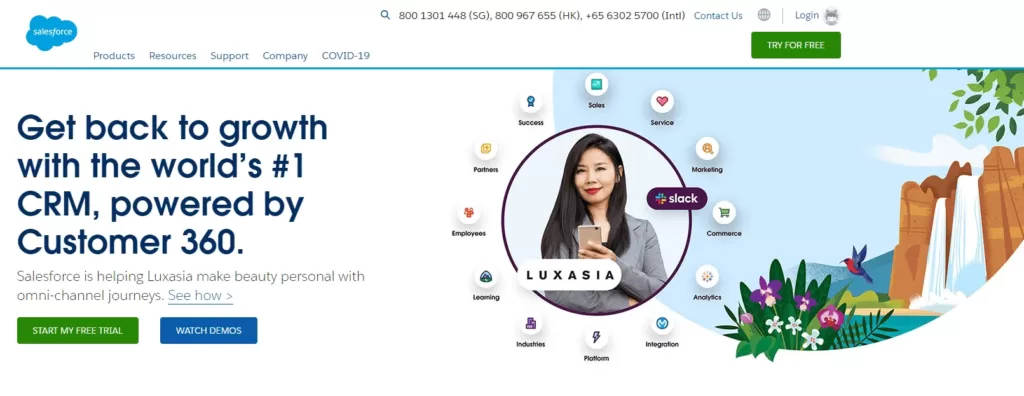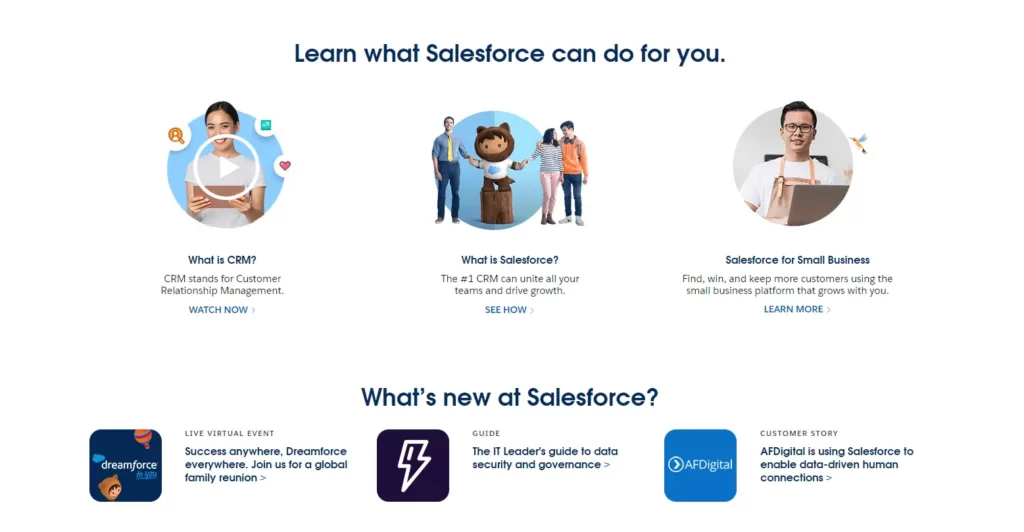Table of Contents Show
Salesforce is a market leader in enterprise cloud computing, emphasizing customer relationship management, or CRM.
The company launched the first CRM platform in February 2000, and it has since added new editions, solutions, features, and platform capabilities.
Salesforce is a cloud-based enterprise software provider specializing in customer relationship management to help organizations communicate with clients and understand them better.
The Company’s primary focus areas include cloud technologies, mobile technologies, social technologies, and Internet of Things (IoT) technologies.
Salesforce business model is a subscription-based cloud service. Over 92 percent of Salesforce’s revenue comes from cloud CRM (Customer Relationship Management) services, ranging from sales to marketing.
The remaining revenue is mostly derived from professional services. The corporation earned $8.39 billion in revenue in 2017.
What is Salesforce?
Salesforce is a cloud-based software as a service (SaaS) company, which means it hosts an online application for clients.
It is a subscription-based business that operates on a pay-as-you-go basis. All Salesforce data and information is stored in the cloud, making Salesforce accessible through any device.
Additionally, it allows for live data tracking and accurate real-time changes.
SalesForce is a company that specializes in CRM (customer relationship management). Businesses can improve their interactions with consumers using a CRM platform, as you might expect.

Businesses can use the software to identify the top leads for their business and suggest ways to keep them there.
Salesforce features are also designed to keep existing customers happy, which increases brand loyalty.
Salesforce is quickly emerging as the industry standard, although there are others.
The service provides a broad range of services that help businesses connect with their customers more meaningfully.
| Company Name | Salesforce.com, Inc. |
| Company Type | Public |
| Founders | Marc Benioff, Parker Harris |
| Product | CRM Software |
| Founded Date | February 1999 |
| Headquarter | San Francisco, CA |
| Website | Visit Website |
How Does Salesforce Work?
Salesforce.com, Inc. is a San Francisco, California-based cloud-based software corporation.
It offers a customer relationship management (CRM) service that enables businesses to communicate with and learn more about their customers.
Salesforce’s services enable organizations to improve customer, partner, and prospect interactions by leveraging cloud technology.
Customers’ behavior patterns are tracked, marketing is provided, and the software offers many other services. It has become the industry standard in customer success.
The company also offers enterprise products that concentrate on customer care, marketing automation, analytics, and application development.
Software as a service (SaaS) providers host and make available online software through cloud computing technology.
Salesforce hosts various cloud platforms that can engage with different data types and serve consumers in various ways.
Salesforce will have numerous cloud platforms in place by 2020, including a service cloud, a marketing cloud, a health cloud, an app cloud, and analytics cloud, an IoT cloud, a Chatter cloud, a commerce cloud, and a Heroku engagement cloud.
Salesforce is essentially the all-in-one cloud software solution that enables businesses and organizations to manage, expand, and communicate with their client base and income streams.
The company offers a cloud-based customer relationship management service that aims to retain customers.
Salesforce enables businesses to have a deeper understanding of their customers and communicate with them on various levels while growing their client base.
Many cloud-based programs can help businesses increase sales and productivity: these programs track customer analysis, complaints, success stories, and customer reports.
Businesses implementing Salesforce software typically experience increased customer happiness, lead conversion, sales revenue, and deployment speed.
Salesforce is a cloud-based software provider that offers a range of cloud-based solutions to help customers with marketing, performance monitoring, data analysis, sales tracking, communication upkeep, spending, and implementing sales strategies, among other things.
Salesforce has been incorporating artificial intelligence into their Einstein software to aid in the simplification of analytics and workflows, resulting in more accurate forecasting and other benefits.
Salesforce offers a variety of cloud platforms for a variety of specialized purposes. Several of them include the following:
The Sales Cloud is a collection of sales, marketing, and customer support resources. Business-to-business (B2B) and business-to-consumer (B2C) organizations can use this approach to provide individualized customer purchases.
Businesses may communicate with customers in the most effective manner possible by utilizing the Marketing Cloud.
The application makes personalized content based on a user’s interests, activities, and other information. People’s social media interactions, shopping behaviors, and other activities may collect data.
The Analytics Cloud, which is also known as Einstein Sales Analytics, enables organizations to connect with data and, as a result, close more deals.
Businesses can identify patterns, identify opportunities, and monitor team performance using simple data visualization features.
Advanced artificial intelligence is establishing a foothold at the platform’s core. CRM continues to evolve in terms of capabilities, but it remains the company’s heartbeat.
Salesforce explains that content relationship management solutions let you focus on your organization’s relationships with specific people – such as your customers, service users, colleagues, or suppliers – throughout your relationship’s lifecycle, from acquisition to support to customer management.
The platform has come a long way since its inception, and its evolution is set to continue as more organizations rely on it to scale their efforts.
Salesforce Business Model
The value-added component of Salesforce’s business model is its rapidly deployed, readily customized, and easily integrated services.
Salesforce created a simple CRM solution that is easy to use and manage compared to traditional CRM software.
Salesforce’s services are delivered in two distinct ways.
- Through the most popular internet browsers and mobile devices,
- through direct and indirect sales efforts through partners.
Salesforce’s business model is centered on subscriptions. Over $7.75 billion of their revenue comes from cloud services.
Annual subscriptions account for 93% of revenue, while professional services account for 7%.
The subscription-based revenue model is a business model in which clients pay a recurring fee for access to products at regular intervals; it reduces an upfront cost.

It enables members to pay for subscriptions in increments rather than making a hefty upfront payment.
Subscription-based payment options entice clients to stay for an extended time compared to, hence strengthening customer connections.
How Does Salesforce Make Money?
Subscriptions/support and professional services such as training are the two main revenue streams for Salesforce.
Salesforce.com earns money by selling customer relationship management (“CRM”) software.
Let us understand the areas from which Salesforce generates revenue in detail:
1. Cloud-Based CRM Software
Salesforce generates revenue by selling sales leads to invoice lifecycle management, Service Cloud personalized support and customer service, and Marketing and Commerce Cloud campaigns to consumer lifecycle management in this section.
2. Cloud Software Division
The Salesforce Platform, which comprises Platform-as-a-Service tools, MuleSoft Anypoint Platform, and Quip Collaboration Platform, among others, is how Salesforce generates revenue.
3. Consulting & Services
Salesforce makes its money selling technical assistance related to the deployment and maintenance of systems.
What is the Funding and Valuation of Salesforce?
Crunchbase reports that Salesforce has raised $65.4M in funding over 6 rounds of venture capitalist funding.
Salesforce is currently valued at $258 Billion as of September 2021. Salesforce went public on New York Stock Exchange (NYSE) on June 23, 2004, raising $110 million from its IPO.
What is the Revenue of Salesforce?
Salesforce reported revenue of $26.2 Billion to $26.3 Billion for the financial year 2022.
Short History of Salesforce
Marc Benioff worked for Oracle as a Senior Vice President. He chose to start his firm after returning from a sabbatical.
His objective was to develop a Customer Relationship Management (CRM) solution that did not sell bundled software (as was customary at the time) but rather stored customers’ data on central servers and made it accessible via the Internet.
Salesforce was founded on February 3, 1999, by Marc Benioff, Parker Harris, Dave Moellenhoff, and Frank Dominguez as a software as a service (SaaS) company and was publicly launched between September and November 1999.
Benioff used the term “software-as-a-service” to refer to this new model of delivery. It would streamline sales processes and link salespeople to log contacts, prospect talks, and other pertinent data online.
This would eliminate the need to purchase hardware and software and the associated costs of installation, customization, and maintenance. As a result, significant cost reductions would result.
Salesforce was created by Benioff in 1999. He hired Parker Harris, Frank Dominguez, and Dave Moellenhoff from Left Coast Software’s consulting firm.
The team devised a solution and then sought funding. On the other hand, investors requested that they enhance their offering with a CRM software package, assuming that this would increase clientele.
Benioff declined, preferring to maintain his hosted model. As a result, he utilized $6 million of his funds and $2 million from Oracle CEO Larry Ellison to get things started.
Salesforce.com began operations in February 2000 with a focus on small businesses. It charged consumers $50 per month for five users. It was a huge success; within four months, its customer base had grown to 5,000.
Initially, the system focused on automating sales operations, allowing users to go from their contact list to account information and sales leads via tabs.

However, it grew by automating different customer care and marketing functions, transforming into a full-featured CRM application, and expanding its attractiveness to larger businesses. Salesforce went public in 2004.
In June 2004, the business raised US$110 million in an initial public offering on the New York Stock Exchange under the ticker symbol CRM.
Larry Ellison, Magdalena Yesil, Halsey Minor, Stewart Henderson, Mark Iscaro, and Igor Sill, a founding member of Geneva Venture Partners, were early investors.
Salesforce announced the construction of its Customer Success Platform in October 2014. The Customer Success Platform will connect Salesforce’s services, including sales, service, marketing, analytics, community, and mobile apps.
Salesforce announced a Facebook Analytics solution for business-to-business marketers in October 2017. Salesforce teamed with Apple in September 2018 to improve business apps.
Key Takeaways From Salesforce Business Model
Salesforce’s primary revenue stream is from its cloud service subscriptions. Salesforce generates over 92 percent of its income through its four different CRM (Customer Relationship Management) services, including sales, marketing, and customer support.
The remainder of its revenues come from professional services and other sources. These include expenses for consultancy, implementation, and training.
Additionally, Salesforce offers training classes on establishing, using, and administering the service per person, per-class basis.
Salesforce is one of the few customer relationship management programs that organize your data while providing you with limitless renewing options.
You should feel confident about choosing the right CRM for your business now that you understand what Salesforce offers.